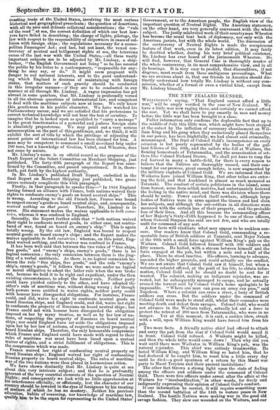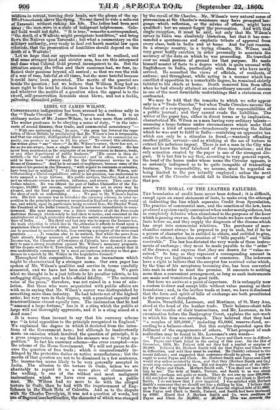THE NEW ZEALAND BLUNDER.
WELLINGTON'S saying, "That England cannot afford a little war," will be amply verified in the case of New Zealand. We have a little war now raging there, and certainly we cannot afford the cost. Yet we shall have to pay smartly in men and money before the little war has been brought to a close.
Fuller information only confirms the deplorable feet that up to the middle of July this little war, which might have been stopped at the outset by the infliction of summary chastisement on Wil- liam King and his gang when they audaciously placed themselves in our power, has been frightfully, wo had almost said criminally, mismanaged. The fruit of Colonel Gold's incompetence on every occasion is but poorly represented by the bodies of the gal- lant fellows of the 40th, and the sailors who fell at Waitara, the flaming homesteads of Tataramaika, and the assassination of set- tlers like Colonel Richard Brown. We shall yet have to reap the red harvest in many a battle-field, for there is every reason to believe that the Natives are thoroughly roused, and. their con- tempt for our prowess, great enough before, is now augmented by the military exploits of Colonel Gold. We are informed that the Waikatos have joined William King, that other tribes are enter- ing the field, and that Auckland is almost as much menaced as Taranaki. The conduct of certain politicians in the island, some from honest, some from selfish motives, had unfortunately fostered the feeling in the native mind, and there was division where there should be unity. Power exerted itself nowhere, although large bodies of Natives were in arms against the Queen and had slain her subjects, and although the out-settlers in all directions were menaced with the certain loss of their property, and the probable loss of their lives. And all this because the commanding officer of her Majesty's Sixty-Fifth happened to be one of those officers, whom General Simpson has said are not few, and who are totally unfit for command of any sort. A few facts will vindicate what may appear to be reckless cen-
sure. Our readers know that Colonel Gold, commanding a re- spectable force of British soldiers at Taranaki, sent Major Nelson of the 40th with a small force against William King's pah on the Waitara. Colonel Gold followed himself with 300 soldiers and fifty seamen. He halted, with a stream between himself and the force engaged at the pah, but within a mile and a half of the place. There he stood inactive. His officers, burning to advance, ascended the higher grounds, and could actually see the conflict. We aro not aware that Colonel Gold saw it himself, but when a volunteer colonist offered, at the peril of his life, to obtain infor- mation, Colonel Gold said he should no doubt be sent for if wanted. The colonist, making an indignant rejoinder, was ar- rested, but he subsequently managed to escape, and he actually crossed the torrent said by Colonel Gold's home apologists to be impassable. " Where one man can pass an army can pass," said Napoleon. Where a colonist can cross a river, a body of British soldiers can cross. But the soldiers under the command of Colonel Gold were made to stand still, whilst their comrades were meeting death and defeat from savages. Colonel Gold, who would not advance in the Waitara valley, actually, led out a force to protect the retreat of 200 men from Tataramaika, who were in no danger. Yet at this moment, it is said, a sudden blow, struck with a will, upon William King would have forced him from his pah.
Two more facts. A friendly native chief had offered to attack
and carry the pah from the rear if Colonel Gold would assail it in front. Colonel Gold refused. A Waikato might be killed, and then the whole tribe would come down Then why did you wait until there were Waikatos in William King's pah, was the natural rejoinder. This chief was entirely trustworthy. He hated William King, and William King so hated him, that he had declared if he caught him, to roast him a little every day until he died—a good specimen of a return by this Maori war party to Maori Toryism and their ancient institutions! The other fact throws a strong light upon the state of feeling among the officers and soldiers under the command of Colonel Gold. There were five officers under arrest after the affair at the Waiters for "insubordination," in other words, for freely and indignantly expressing their opinion of Colonel Gold's cond. act. If our information be correct, it will require something' more than the second battalion of the 14th to restore pesos in New Zealand. The hostile Natives were making war in the good old savage fashion. They slew our wounded on the Waiters, and our peldiersin reffeR.terniig then i tligleam' of -the up- Mittemahawk above the dying1SMIfdteel-to • ride a mile out pf Tarenaki 'without risking his life.. -The.lailiee had been sent -the Men. were in a state of indigneut helplessness. Cole- 41d. would not tight. " It. is true;" remarks skorrespondent, ,death ef. a- Waikato might:precipitate' hostilities;" and 'bring llikfives upon Taranaki; but•what a commentary'on the 44therity,, ever ready to 'deal out -harsh martial law upon bat the. p'rosecution of hostilities should depend on the 'ef a Waikato us hope that our apprehensions will not 'be realized, and some stronger head and stouter arm, has are this interposed thine what ColOnel Gold.proved incompetent to 'do. But the 'lion among the tiibes and their successes: had, we fear,' in- ed their passions beyond all control; so that we runthe-riak -ii war of race, hateful, at-all times, butthe-more hateful because old 'have prevented. The Merits of the quarrel, are *dothe question ; but we believe that William King 'hadno Pare right to the land he claimed than he has:to Windsor Park ; mid whatever the. merits of a question when the .appeal is to the Sword, self-preservation demands stout blows, and not a feeble, paltering, disunited policy.



























 Previous page
Previous page